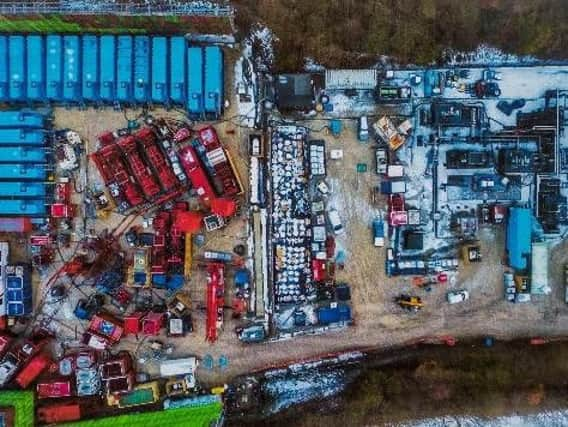Why is fracking controversial and what led to the Government moratorium?


Attempts to establish a UK shale gas industry proved slow and were thwarted by public concern over its environmental impact.
Here is some background on the fracking process and its chequered history in the UK:
- What is fracking?
Advertisement
Hide AdAdvertisement
Hide AdMore properly known as hydraulic fracturing, fracking is a process in which liquid is pumped deep underground at high pressure to fracture shale rock and release gas or oil trapped within it.
- How much potential is there for developing shale gas and oil in the UK?
Assessment by the British Geological Survey (BGS) suggested there are an estimated 1,300 trillion cubic feet of shale gas resources in the Bowland Shale across northern England.
Estimates from 2013 for the size of the Bowland Shale reserve found it could potentially provide up to 50 years of current gas demand.
Advertisement
Hide AdAdvertisement
Hide AdBut a study published in August this year by the University of Nottingham and BGS suggested there may be less than 10 years' gas at current levels of demand.
There are "modest" shale gas and oil resources in Scotland, with an estimated 80 trillion cubic feet of gas and six billion barrels of shale oil in the Midland Valley stretching across Scotland and including Glasgow and Edinburgh.
There is an estimated 4.4 billion barrels of shale oil in the Weald Basin in southern England.
But it is not known how much of the resources can be extracted, with exploitable reserves thought to be much lower than the total estimated oil and gas.
- Why is fracking controversial?
Advertisement
Hide AdAdvertisement
Hide AdThe process has been mired in controversy since it hit the headlines in 2011 for causing two minor earthquakes in Lancashire, prompting a temporary ban on fracking in the UK.
The ban was later lifted, with controls put in place to prevent tremors, but fracking continued to attract opponents who feared it could also cause water contamination, as well as generate noise and traffic pollution at the drill sites.
Shale firm Cuadrilla, the only company to start fracking in the UK, was forced to pause operations in Lancashire when seismic activity at record-breaking levels occurred.
Environmentalists warned that pursuing new sources of gas - a fossil fuel - is not compatible with efforts to tackle climate change, and the focus should be on developing cleaner sources of energy such as renewables.
- Why was fracking backed by the Government?
Advertisement
Hide AdAdvertisement
Hide AdBefore the moratorium was issued, ministers had hoped a shale gas industry could boost tax revenues, create jobs, reduce reliance on energy imports and bring down household fuel bills, although experts have questioned whether it would have made any impact on energy prices.
The Government took steps to get the industry going, such as introducing tax breaks and community payments, and proposed changes to planning rules to get schemes off the ground more easily.
A National Audit Office (NAO) report released last month said the Department for Business, Energy and Industrial Strategy (BEIS) felt that climate change objectives could be met while developing shale gas, but that the necessary technology has not yet been developed.
A report by the Oil and Gas Authority published on Saturday found it was not currently possible to accurately predict the probability or magnitude of earthquakes linked to fracking operations.
Advertisement
Hide AdAdvertisement
Hide AdThis helped trigger the Government's decision to call a halt to new fracking and abandon proposed planning reforms for shale gas developments.
- Where has fracking been pursued and opposed in England?
Cuadrilla has targeted shale gas extraction in Lancashire for a number of years.
In October 2018, an environmental campaigner failed in a High Court bid to block operations at the company's Preston New Road site.
But a record-breaking tremor measuring 2.9 on the Richter scale was felt near the site in August this year and fracking has been indefinitely suspended since.
Advertisement
Hide AdAdvertisement
Hide AdPlanning permission for another fracking site at Roseacre Wood, also in Lancashire, was refused by the Government in February after an appeal by Cuadrilla.
In December last year, the National Trust withdrew its legal opposition to seismic surveying by energy company Ineos at Clumber Park, in Nottinghamshire, but vowed to fight to protect the site from fracking.
Ineos won the right in 2018 to pursue a High Court action to gain access to the Grade I-registered landscape for surveying, as part of efforts to assess the area for shale gas.
In January, it was revealed that Greater Manchester's 10 local authorities will put a "presumption" in planning laws against fracking as part of a new green strategy to make the city carbon neutral by 2038.
Advertisement
Hide AdAdvertisement
Hide AdIn March, the Government's new planning guidance relating to fracking was found to be unlawful by the High Court following a legal challenge by environmental campaigners.
- What's the position elsewhere in the UK?
The Scottish Government confirmed its "final policy position" on fracking as being one of no support in October this year, following a moratorium on the issue.
In Wales, the Assembly government has adopted a policy "to not undertake any new petroleum licensing or support applications for hydraulic fracturing petroleum licence consents".
In Northern Ireland, there is a planning presumption against fracking.